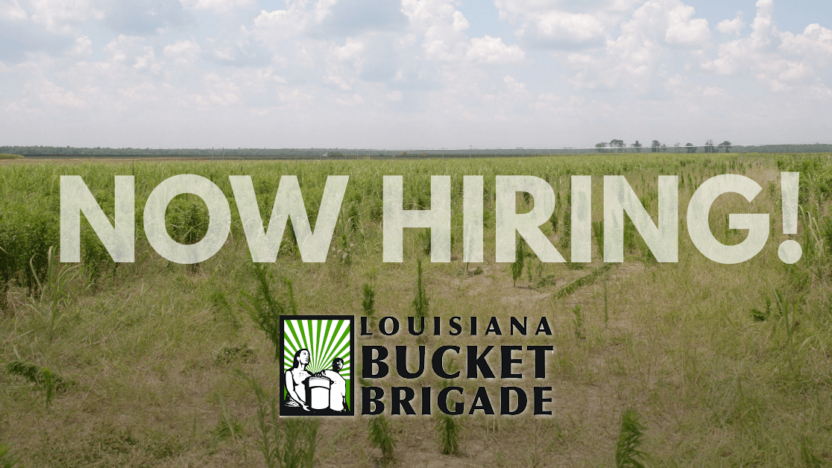
NOW HIRING: Cultural Economy and Black History Fellow (ACLS Fellowship)
To apply: Apply through the ACLS Online Fellowship application system. For more information, please visit the Leading Edge page on the ACLS site.
For more information on the Leading Edge Fellowship program, please visit https://www.acls.org/Competitions-and-Deadlines/Leading-Edge-Fellowships.
The Louisiana Bucket Brigade, founded in 2000, is a 501(c)(3) environmental health and justice organization working with communities that neighbor the state’s oil refineries and chemical plants. We use grassroots action to create an informed, healthy society that holds the petrochemical industry and government accountable for the true costs of pollution to hasten the transition from fossil fuels. Our vision is a Louisiana that is a healthy, prosperous, pollution-free and just state where people and the environment are valued over profit.
The heart and soul of what we do is supporting communities impacted by the petrochemical industry in Louisiana. The disproportionate impact of the petrochemical industry on Louisiana’s African American community has its roots in prior centuries. As such, our work includes historic components, including the identification of historic assets as a way to build power and oppose the siting of petrochemical companies in these communities.
Purpose of Position: The purpose of the Cultural Economy and Black History Fellow is to identify historic and cultural assets along the region known as Cancer Alley. These assets will provide the foundation for exploring the viability of building a more robust economy in a region where most government officials see petrochemicals as the sole road to development.
Reports to: Economic Diversification Fellow
Job Status: Full-time, 40 hours per week
ACLS Fellowship Stipend: $60,000 per year, plus health insurance and professional development funding
Start Date: September 2021
Location: New Orleans (This is a remote position, but a knowledge of the region is a requirement. Local candidates preferred.)
Project Background and Description
Our project needs are twofold:
1. Identification of Freetowns and burial sites.
The region between New Orleans and Baton Rouge, Louisiana is referred to as Cancer Alley because of the carcinogenic emissions from the concentration of oil refineries, chemical plants and other petrochemical infrastructure. This region was the historic location of sugarcane and cotton plantations, and the footprint today reflects that legacy: many of the petrochemical facilities are on the same land where the plantations once stood.
This land use pattern means that the petrochemical plants have eradicated or threatened Freetowns and other historic Black communities. They are also on or near burial sites of enslaved people, as evidenced by the cemeteries at the Shell Refinery in Convent and the recently discovered graves on the proposed site of Formosa Plastics. The latter were discovered because of our collaboration with St. James residents, who insisted that graves were on the proposed site. We engaged a land use expert and a lawyer, who in turn engaged an archeologist to confirm what the residents had been saying.
In December of 2019, St. James residents made the public announcement of the discovery of graves on the property, a fact that Formosa Plastics representatives knew but failed to disclose to parish officials while their land use application was under consideration. This was a travesty for the community, who deserved to know about their ancestry at the earliest possible moment. This component of our project involves collaborating with our partners to identify sites – both Freetowns and gravesites – in order that they might be protected, preserved and honored.
2. Develop the cultural economy.
The main reason that these petrochemical plants are allowed in Louisiana is because of the jobs that the projects create (not totally true but emphasized via heavy marketing tactics). In order to protect our partner communities from relentless expansion, our region needs a more robust economy. We believe that the region’s African-ancestored history provides a solid foundation to develop a cultural economy.
Our region has powerful Black history: numerous Freetowns and burial sites, the site of the largest slave revolt in history (1811), the site of a Mary McLeod Bethune school dedication and much more. We would like to explore how to create a foundation for a cultural economy via these strengths.
Essential Duties and Responsibilities:
1. Conduct research on historical cemetery/burial sites and cultural economy
a. Collaborate with partners to understand the current state of work in both cemetery and cultural economy areas
b. Research best practices in these fields in other parts of the U.S.
c. Identify or create a roster of Black history sites along Cancer Alley, including burial sites, museums, historic markers, tours etc., including their stage of development, i.e., newly sited or mature
d. Assist in developing proposals to fund the work
e. Remain informed on all political aspects that can impact the project
f. Produce a research and strategy plan that will direct the organization’s efforts within a designated time frame
g. Produce documents and reports for the public as necessary
2. Create a plan for developing the Cultural Economy
a. Research other parts of the country to understand how they have transformed Black history into economic drivers
b. A final product should be a self guided Black History Trail along Cancer Alley
3. Identify Freetowns and cemeteries/burial sites of former enslaved people along the Cancer Alley portion of the Mississippi River
a. Collaborate with our community partners to identify sites – both Freetowns and gravesites
b. Conduct research among family members, in courthouses, archives and any other places where documents are housed that provide evidence of claims
c. In collaboration with our professional partners–The Texas Freedom Colonies Project at the University of Texas, Austin and Forensic Architecture in London, England–compile geo-mapping evidence of former enslaved people’s cemeteries and burial sites
d. Compile family histories consisting of vital records and all other documentation that provide a full historical record and picture of each family’s connection to the location
e. Understand the Louisiana Unmarked Human Burial Sites Preservation Act and how it can be utilized for African American sites
f. Understand the African American Burial Grounds Network Act and work with relevant Congressional offices to include Louisiana sites
g. Understand the Native American Burial Act to discover if there are aspects of the act that can be adapted to be relevant to African American burial sites
Qualifications:
- PhD in any field of the humanities or humanistic social sciences. Applicants must have a PhD conferred between September 1, 2016 and October 1, 2021. All applicants should be prepared to verify their dissertation filing/deposit date and the actual or anticipated date of the conferral of their degree with official university documentation during the review and selection process.
- Excellent research and interpersonal skills
- Demonstrated interest in the cultural economy / business
- Excellent organizational skills and detail-oriented approach
- Willingness to work in a collaborative community organization environment, accountability to goals, and ability to work independently
- Ability to work under time pressure, meet deadlines, and prioritize tasks
- Alignment with LABB’s mission and values
- Valid driver’s license.
Preferred Qualifications:
- Based in Louisiana
- Project management experience
- Familiarity with the region of focus
- GIS skills: Data collection and evaluation, visualization, and analysis
- Since some of the historic documents are in French and Spanish, familiarity or fluency in those languages would be an asset
To apply: Apply through the ACLS Online Fellowship application system. For more information, please visit the Leading Edge page on the ACLS site.
